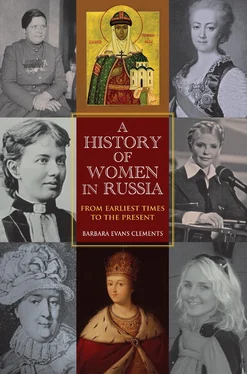Among the Rus, as among other Scandinavian and Germanic peoples, women were also valued for their peacemaking skills. The Primary Chronicle, a history of the Kievan princes written by monks in the twelfth century, tells of a princess trying to mediate between her warring sons. Identified only as Vsevolod’s widow, she was the mother of Vladimir Monomakh and grandmother of those four princesses who married foreign royals. In 1097, when her sons and their cousins were vying for the throne at Kiev, she went, with the head of the church, the metropolitan, to urge Vladimir to make peace. “We beseech you, oh Prince, and your brethren not to ruin the land of Rus,” she pleaded. Vladimir burst into tears and agreed. “Thus he obeyed her as he was bound to obey his mother,” the chronicler intones. She returned to Kiev to beg Vladimir’s cousin Sviatopolk, the reigning prince, to reconcile with his enemies. Sadly, her motherly appeals did not end the dispute. 4
Princesses could not become rulers in their own right. This was the general practice across Europe, although the feudalism of the West did enable a few women who inherited fiefdoms to exercise considerable power. Far more common among the Rus and other Europeans was the custom of widows serving as regents for their minor children or taking up their husbands’ administrative duties when the men were away. Seals bearing the names of such Rus women have been unearthed in archaeological digs. We do not know how many regents or temporary administrators there were, but we can identify the one whose political career earned her the greatest fame.
 OLGA (c. 915-c. 969)
OLGA (c. 915-c. 969) 
Olga, the widow of Prince Igor of Kiev, was regent to her son Sviatoslav from 945 to the late 950s or early 960s. She is best remembered for the murderous revenge she took on the Derevlians, perennial enemies of the Rus, after they had defeated and beheaded her husband. The Primary Chronicle recounts that the victorious Derevlians proposed to Olga that she marry their prince and thus unite the two warring peoples. It was an offer they expected her, a vulnerable woman, to accept. This proved to be a fatal misunderstanding of her character. Olga buried alive the first group of Derevlian ambassadors who came to arrange the marriage. Then, on the pretext of accepting their offer, she went to the Derevlians’ capital, camped outside the city walls, hosted a great feast, and finished the celebration by massacring her drunken guests. She then laid siege to their city. When the townspeople sued for peace, Olga directed each household to give her an offering of three pigeons and three sparrows. They sent them to her, and she ordered her soldiers to tie matches to the birds’ feet and light them. Released, the terrified creatures took their flaming burdens home and set the city afire. Thus did Olga avenge Igor and defend the Rus lands from the Derevlians.
This bloody tale is probably a myth. Scandinavian folklore delights in stories of widows exacting hideous revenge. The monk who wrote about Olga’s life in The Primary Chronicle almost two centuries after her death probably told the story to illustrate her cleverness and courage, and her willingness to use those talents in defense of her people’s independence. These were the themes of the rest of his account of her life, which is more solidly grounded in the historical record. He writes about her conversion to Christianity, which is confirmed by Byzantine sources, and her wisdom as a ruler. Olga served as regent for her son for more than a decade, during which time she increased government revenues, improved relations with other princely families, and strengthened ties to Byzantium. The princess also led a delegation of priests and male and female advisers to Constantinople, where she negotiated trade agreements with the emperor and was baptized, with the emperor standing up for her as godfather. 5

A modern copy of an ancient icon depicting St. Olga. http://it.wikipedia.org/wiki/File:Helga_Olga.jpg . Accessed June 27, 2011.
OLGA
The Primary Chronicle provides the following account of Olga’s conversion:
“Olga went to Greece [Byzantium] and arrived at Tsargrad [Constantinople]. The reigning Emperor was named Constantine, son of Leo. Olga came before him, and when he saw that she was very fair of countenance and wise as well, the Emperor wondered at her intellect. He conversed with her and remarked that she was worthy to reign with him in his city….
When Olga was enlightened, she rejoiced in soul and body. The Patriarch [head of the Church], who instructed her in the faith, said to her, ‘Blessed art thou among the women of Rus, for thou hast loved the light and quit the darkness. The sons of Rus shall bless thee to the last generation of thy descendants.’ He taught her the doctrine of the Church, and instructed her in prayer and fasting, in almsgiving, and in the maintenance of chastity. She bowed her head, and like a sponge absorbing water, she eagerly drank in his teachings.”
SOURCE: SAMUEL HAZARD CROSS AND OLGERD P. SHERBOWITZ-WETZOR, TRANS. AND EDS., THE RUSSIAN PRIMARY CHRONICLE, LAURENTIAN TEXT (CAMBRIDGE, MASS.: MEDIAEVAL ACADEMY OF AMERICA, 1973), 82.
When her son reached his majority, Olga became a powerful royal mother. During Sviatoslav’s incessant wars, she governed Kiev and oversaw the rearing of her grandchildren, among them the future Vladimir I. The Chronicle portrays Olga as begging her son to convert to Christianity, which he refused to do on the grounds that his men scorned the faith as a woman’s religion. “He did not know that whoever does not obey his mother shall come to distress,” the chronicler declares. 6Sviatoslav, ever the valiant and enthusiastic warrior, was killed in combat sometime after Olga’s death. Vladimir, who grew up under his grandmother’s supervision, did convert, and he decreed that all the Rus should become Christians too.
CHRISTIANITY
Many elite Rus women were converting to Christianity in the tenth century, and probably many of them persuaded their male relatives to be baptized. Elite women across Europe had played this role in the spread of Christianity since Roman times. In the centuries after Olga’s death, the new faith slowly spread among the elite, then moved out into the countryside, merging with the pagan beliefs the Rus had inherited from their ancestors. As it became a part of Rus culture, Christianity brought new institutions into women’s lives and shaped the gender values of their world.
Vladimir’s conversion officially affiliated the Rus with the eastern branch of Christianity. When he converted, disagreements between the church authorities in Constantinople and those in Rome were dividing Christendom into a Catholic West and Orthodox East. The Catholics and the Orthodox agreed on the basic articles of the faith, but differed on a few theological issues, as well as on matters of church organization. These differences would affect the development of Christianity among the Rus, and the hostility between Catholicism and Orthodoxy would also sour the relations between Catholic Europe and the Rus and their successors, the Muscovites.
From Olga’s time onward, elite women figured prominently among the converts. They became generous patrons, donating money to build churches and monasteries and to purchase precious liturgical objects such as chalices. Some high-born women also participated, as did men of their rank, in the selection of church officials. A twelfth-century princess, Verxoslava, wrote to the Metropolitan Simon, the head of the Rus church, “that she would like [Polikarp] appointed bishop… ‘even if I have to spend a thousand pieces of silver’” to get the prelate to agree. Simon quoted Verxoslava in a letter he wrote to Polikarp. He frankly told the latter that he had refused the princess’s request because Polikarp was too ambitious. Simon did not, however, condemn Verxoslava for making the nomination. Rather, he considered her efforts to be part of the normal scheme of things. 7
Читать дальше

 OLGA (c. 915-c. 969)
OLGA (c. 915-c. 969) 











